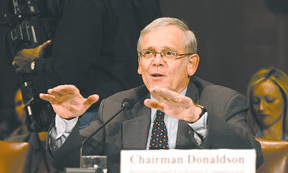The U.S. Securities and Exchange Commission will propose rules as early as next month designed to block trading abuses in mutual funds, SEC Chairman William Donaldson said.
The SEC has been investigating trading practices at major mutual fund companies since early September when New York Attorney General Eliot Spitzer revealed his probe into illegal trading in the $7 trillion mutual fund industry.
The potential SEC rules would address “late trading” and frequent trading, known as “market timing,” Donaldson said. One possible change would be to end the practice of letting mutual fund companies price as same-day orders trades from brokers that come in after the 4 p.m. pricing close.
“It is clear from information developed thus far that there are additional regulatory actions that the commission should consider in seeking to eliminate or significantly curb late trading and market timing abuses in the future,” Donaldson said in a statement.
Currently, brokers can turn in orders to mutual funds after the fund values its shares, usually at 4 p.m., and still get the previous price as long as brokers show they received the orders before 4 p.m. Donaldson said the SEC is considering requiring mutual funds to give all orders that come in after the closing deadline the next day’s price.
“This would effectively eliminate the potential for late trading through intermediaries that sell fund shares,” Donaldson said.
Other rules under consideration would require mutual funds to put additional compliance procedures in place to prevent both late trading and market timing, Donaldson said. Late trading, which lets favored customers get the previous price no longer available to other investors, is illegal and violates SEC rules.
Market timing is discouraged by many mutual funds but is not specifically outlawed.
One possible new rule would require mutual funds to disclose in their offering documents whether they allow investors to use market-timing trading strategies, which involve frequent trades that take advantage of changes in the value of stocks owned by the mutual funds, Donaldson said.
The SEC also may “emphasize” that mutual funds have an obligation to adjust the prices of foreign-traded stocks in their portfolios to reflect the shares’ “fair value,” Donaldson said.
Burton Greenwald, a Philadelphia-based consultant for mutual fund companies, said the mutual fund industry isn’t likely to fight additional SEC regulation as it seeks to put the Spitzer and SEC investigations behind it.
“The industry is deeply concerned about its reputation and continuing to enjoy
the confidence of investors,” Greenwald said in an interview. “I think the industry
will embrace any reasonable regulations coming out of the SEC.”
Robert Schmidt is a writer for Bloomberg News.













